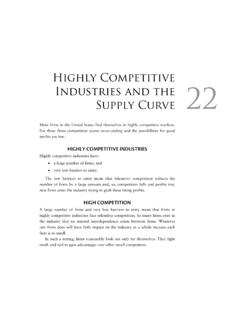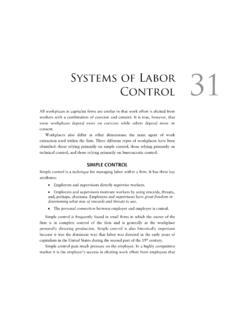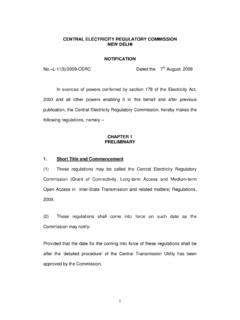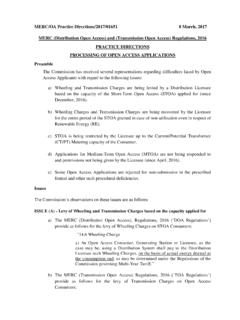Transcription of IS CAPITALISM NATURAL?
1 economic systems are differentiated according to how the dominant class gets the surplus. The ways that the dominant class can get control over the surplus generated within the economy is limited only by the imagination: an astounding number of different economic systems have appeared in human history. A relatively small number of economic systems, however, have played a central role in economic history: kinship production, feudalism, CAPITALISM , slavery, and socialism. Some of these economic systems are ancient. For instance, kinship production and slavery date from the beginning of human history approximately 100,000 years ago. Other economic systems are not so ancient. Indeed, some economic systems appeared only very recently.
2 In this chapter I present a general overview of some of the most important economic systems. Some notable omissions exist in this discussion and no economic system is discussed in great detail. The economic systems that I discuss are those that provide the greatest insight into the nature of CAPITALISM . Interested readers can find a wealth of book-length discussions of each of the economic systems discussed in this chapter and for many economic systems not discussed below. IS CAPITALISM NATURAL? CAPITALISM the economic system that currently dominates the world has existed in meaningful amounts about 300 years. From one point of view, this is a long time. After all, in the early 1700s 300 years ago the world was a very different place from what it is today.
3 The United States did not yet exist, people accused of witchcraft were still being executed Europe and elsewhere, Japan still refused to 34 DIFFERENT economic SYSTEMS establish political or economic relations with Europe, and the Ottoman Empire was still one of the world s great powers. But from other points of view, 300 years is an extremely brief period of time. For instance, Homo sapiens (that is, you and me) have been around about 100,000 years. CAPITALISM , then, has been around about only of human history (300/100000 = 3/1000 = ). The relative recentness of CAPITALISM fails to support the argument made by some that there is something natural about CAPITALISM or that there is something within the human makeup that makes CAPITALISM the most appropriate economic system.
4 For of human history, non-capitalist economic systems were dominant. For instance, since the beginning of human history an economic system labeled as kinship production has existed. Today most people in the US participate in kinship production (and other economic systems too). Arguably, kinship production might be natural; CAPITALISM , a relatively recent economic system, is likely not natural in the same way that kinship production is. THE ECONOMY The economy is that part of society involved with production and the distribution of what is produced. Production refers to the transformation of the world around us. For instance, bread-making is production: it involves the transformation of flour, yeast, water, and salt into bread.
5 Steel-making involves the transformation of iron, coal, and other chemicals and minerals into steel. Production need not be limited to tangible items such as bread and steel. Music-making is also production: it involves, say, someone blowing through a specially made pipe so that pleasing sounds are made. Air is transformed, via the pipe, into music. Production also need not involve the material world (that is, the world of flour, iron, and air). Production might involve the transformation of items from the social world. For instance, story-making is production: it involves the transformation of ideas and words into a set of words that comprise the story. In general, then, production involves the human transformation of the world around them to make something that people use.
6 Distribution involves the transfer of what is produced to the person(s) who consume it. For instance, once the bread is baked it might be placed into a bakery. Townspeople come to the bakery, pay money, walk out with the bread, and eventually consume it. Distribution might involve buying and selling (as when people come to DIFFERENT economic SYSTEMS 35 the bakery) but it need not. For instance, the baker might give some of the bread to his child to eat: this is distribution although it does not involve buying or selling. Or the baker might simply eat it himself. This is also distribution. The economy is that part of society involved with production and distribution. But production and distribution are defined so broadly that it appears that much of human life can be classified as being part of the economy.
7 This is exactly true. We are surrounded by economic activities. KINSHIP PRODUCTION Kinship production is perhaps the most ancient economic system. The first group of humans likely relied on this economic system for survival and kinship production has most likely been the dominant type of economic system through most of human history. This economic system still exists today. Indeed, many people experience this economic system on a daily basis. But for the most part kinship production today is very different from what it was in the past. DESCRIPTION OF economic SYSTEM Kinship connections dominate kinship production. First, the members of the production unit are members of the same kinship group or family by birth or These people live in close proximity to each other and explicit and clear economic linkages exist between everyone within the group.
8 The members of a given kinship group might be a migratory band of hunter-gathers or a band of farmers who inhabit temporary or semi-permanent settlements. The group making up a particular economy might have hundreds of people or it might involve a few people, such as a modern family. Second, status within the kinship network determined perhaps by some combination of age, birth order, marriage relationships, and, perhaps, intra-family political maneuvering translates to the same status within the economy. Those 1 The social relationships between parents and between each parent and the child created by birth have varied widely over time and place.
9 Further, what has constituted a marriage has varied greatly over time and place. Anthropologists who have studied marriage, however, have concluded that long-lasting alliances between members of the opposite sex appeared soon after the beginning of human history. But marriage is far more than an alliance between individuals linked to sexual reproduction: it also serves to establish a link between an individual and a family with which this individual has no birth relationship. Such links are important for family production as it establishes social obligations and status relationships among people not related by birth. 36 DIFFERENT economic SYSTEMS who are powerful within the family are powerful in the determination of what is produced, how it is produced, and what happens to the surplus (if one happens to exist).
10 No general rule exists for determining who has power within a group of people connected by kinship relationships. However, patriarchy, age, and birth order often play a role in determining status among those living within a particular kinship production unit. In particular, it is often the case that if one is male, if one is older, and if one is the first born to someone who currently has a position of power , then one is more likely to achieve greater power within the family and, so, within the economy in kinship production. In kinship production the economy is not a separate sphere of society that operates according to its own logic. Instead, economic activities are subordinated to power relationships, customs, and traditions that developed within the group of people connected by kinship connections.











